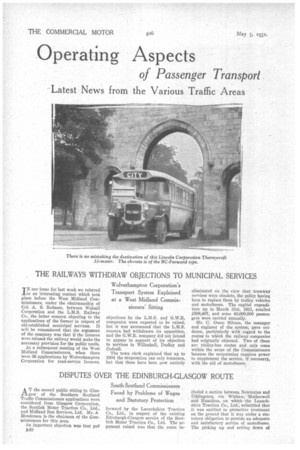Operating Aspects
Page 58

If you've noticed an error in this article please click here to report it so we can fix it.
of Passenger Transport
Latest News from the Various Traffic Areas
THE RAILWAYS WITHDRAW OBJECTIONS TO MUNICIPAL SERVICES
Wolverhampton Corporation's Transport System Explained at a West Midland Commissioners' Sitting IN our issue for last week we referred to an interesting contest which took place before the West Midland Commissioners, under the chairmanship of Col. A. S. Redman, between Walsall Corporation and the L.M.S. Railway Co., the latter concern objecting to the applications of the farmer in respect of old-established municipal services. It will be remembered that the argument of the company was that if the licences were refused the railway would make the necessary provision for the public needs.
At a subsequent meeting of the West Midland Commissioners, when there were 36 applications by Wolverhampton Corporation for road-service licences, objections by the L.M.S. and G.W.R. companies were expected to be raised, but it was announced that the L.M.S. coucern had withdrawn its opposition, and the G.W.R. company did not intend to appear in support of its objection to services to Willenhall, Dudley and Codsall.
The town clerk explained that up to 1904 the corporation ran only tramcars, but that these have been now entirely
eliminated on the view that tramway services were obsolete, the policy having been to replace them by trolley vehicles and motorbuses. The capital expenditure up to March 31st, 1931, totalled £808,407, and some 40,000,000 passengers were carried annually.
Mr. C. Owen Silvers, the manager and engineer of the system, gave evidence, particularly with regard to the routes to which the railway companies had originally objected. Two of these are trolley-bus routes and only come within the scope of the Commissioners because the corporation requires power to supplement the service, if necessary, with the aid of motorbuses.




































































































